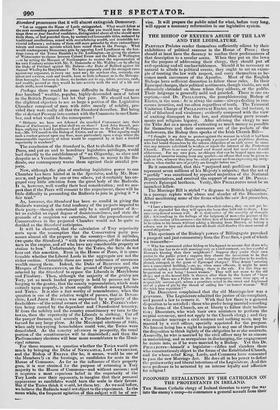them there, or had preceded them, by ancient and honourable
titles, endeared by THE BISHOP OF EXETER'S ABUSE OF THE LAW talents and eminent services which have raised them to the Peerage. What PARTISAN Prelates render themselves sufficiently odious by their would contemporary Democracy gain by opposing Lord Lyndhurst on the bus- exhibitions of political rancour in the House of Peers ; they tinge (even of the Tower Hamlets) to Dr. Lushington—or giving the electors should at least have the decency to confine their performances of of Westminster to choose between Colonel Evans and the Duke of Wellington —or by setting the Marquis of Northampton to contest the representation of that description to a secular arena. When they put on the lawn his own Finsbury estates with Mr. T. Duncombe or Mr. Wakley—or by offering for the purpose of addressing their clergy, they should put off the Duke of Portland against Mr. Bulwer—the Duke of Bedford against Sir evil-speaking and all uncharitableness. Should it be necessary or
comes meek successors of the Apostles. Most of the English
and wealth, pressed as they would be into activity with the zeal of a life and Bishops have sufficient discretion to follow these rules. In their death strife, must triumph." Episcopal charges, their political sentiments, though visible, are not Perhaps there would be some difficulty in finding " three or offensively obtruded on those whom they address, or the public. four hundred " wealthy, popular, highly-descended men of talent Their language is generally mild and guarded. There is one ex- in the British Peerage : but let that pass. We should not have ception,—and Dr. PHILLPOTTS, the pamphleteering Bishop of the slightest objection to see so large a portion of the Legislative Exeter, is the man : he is alway the same—always dealing in ran- Chamber composed of men with titles merely of nobility, pro- covens invective, and too often regardless of truth. The Triennial vided they were really all that the Standard describes. But bring Visitation Charge of PHILLPOTTS at Exeter, on the 3rd instant, is the ci-devant Peerage into contact with the Commons in one Chatn- full of falsehood and virulence; evidently composed with the view
her, and what would be the consequence ? of exciting disrespect to the law, and stimulating party resent-
" Hitherto we have not followed the ennobled Commoners into their ments and religious bigotry. After advising the clergy to use House of Parliament; but what shall we see there ? Lord John Russell, per- the Tithe Act as a means of extracting as much money as possible haps, replying to Lord Lyndhurst—Lord Palmerston to the Duke of Welling- for themselves and their successors out of the pockets of the ton—Mr. O'Connell to the Bishop of Exeter, and so on. What equality could landowners, the Bishop thus speaks of the Irish Church Bill—
"I thought it my duty to protest against the manner in which it had been
carried through the other House, to gratify a perjured and perfidious faction, superiority in numbers?" who had bound themselves by the solemn obligation of an oath never to sane- The conclusion of the Standard is, that to abolish the House of tom any measure calculated to weaken or injure the interest of the Protestant Peers, and put an end to hereditary legislative privileges, would Church. There is no man of sound and honest mind but must view it with lead directly to the establishment of " an Oligarchy, as close and abhorrence. For my own part, no obloquy that can be heaped upon me—no violence of invective coming from any quarter—no offence that may be given to
high or low, whoever they may be—shall prevent me from expressing my indig-
jects. Be it remembered, that this " perjured and I perfidious faction 'j
Now, although the plan of confining legislative power to one represent seven millions of his Majesty's subjects; that the act of
Chamber has been hinted at in the Spectator, and by Mr. ROE- "perfidy " was sanctioned by repeated majorities of the National BUCK, and perhaps by one or two others, yet it certainly has en- Representatives, and received the support of some of Dr. Pima:
POTTS'S Episcopal brethren. Verily, this PHILLPOTTS must be an peel that if the Peers will consent to the experiment, there will be The Marriage Bill is styled "a disgrace to British legislation," little difficulty in persuading the Radicals to join in giving it " a in a passage replete with abuse and slander of the Dissenters. fair trial." After mentioning some of the forms which the new Act prescribes,
" I have a better opinion of the people than their rulers ; they are not yet be.
solemn vow to love and cherish her till death shall dissolve this most sacred of
" ll'ho has warranted either bishop or blackguard to assume that those who
correctly called, a desecrated building ; there is the rub. For this they are
the trick bear repetition ? "
married by a civil officer, specially appointed for the purpose.


























 Previous page
Previous page